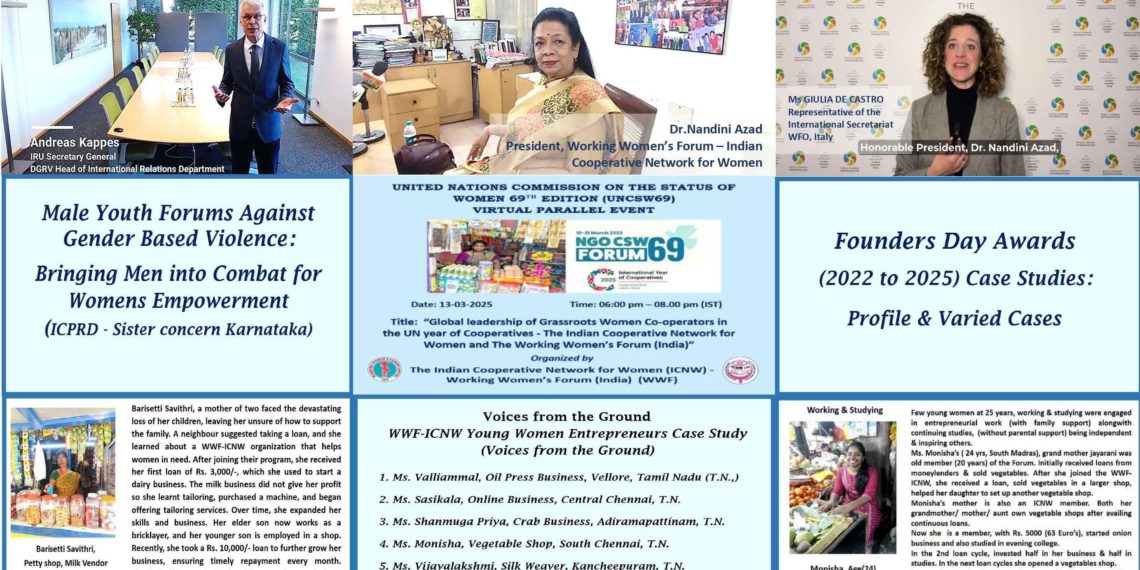The 69th edition of the United Nations Commission on the Status of Women (UN-CSW69) hosted a landmark parallel event titled “Global Leadership of Grassroots Women Co-operators in the UN Year of Cooperatives – The Indian Cooperative Network for Women and The Working Women’s Forum (India).” The event, held virtually from Chennai, showcased the remarkable journey of grassroots women’s cooperatives in India in achieving global leadership.
Organized by the Working Women’s Forum (WWF-India) and the Indian Cooperative Network for Women (ICNW), the event underscored the resilience and contributions of poor women workers from India’s informal sector. With participants from 13 cooperative branches across four southern states of India, the session celebrated the transformation of women facing multiple barriers such as economic struggles, lack of investment opportunities, and social oppression.
The event commenced with an inspiring invocation of Tamil poet Mahakavi Subramaniya Bharathi’s words, “Acham illai, acham illai” (No more fear), resonating with the courage of India’s grassroots women entrepreneurs. Dr. Nandini Azad, President of WWF-ICNW, extended warm greetings to all participants, emphasizing the organization’s mission of mobilizing and training women as cooperative leaders, trade unionists, and civil society members.
For the fifth consecutive year, WWF-ICNW has been awarded a parallel event at the UN-CSW, reinforcing its growing influence on the global stage. The organization’s 45-year journey from grassroots mobilization to international policymaking was highlighted, reflecting its engagement with key global forums such as the United Nations, G20, and International Cooperative Movement.
A major highlight of the event was the presentation by Mr. Andreas Kappes, Secretary General of the International Raiffeisen Union (IRU), the world’s oldest cooperative union. He applauded ICNW’s contribution to empowering women in cooperatives, particularly recognizing Dr. Azad’s historic re-election as the first woman on the IRU Board in 50 years. He also highlighted successful cooperative models from Latin America and Africa.


The event showcased video testimonials from women entrepreneurs whose lives have been transformed by WWF-ICNW. These videos highlighted grassroots training workshops since the 1980s, digital financial literacy initiatives, excellence awards for women entrepreneurs, and policy-level participation in global forums.
One of the most striking success stories was that of women micro-entrepreneurs who started with loans as small as Rs. 200 and have since expanded their businesses with loans up to Rs. 50,000, creating employment opportunities for other women. These stories illustrate the transition of women from the informal to the formal economy, reinforcing the sustainable impact of cooperatives on economic growth.
WWF-ICNW’s leadership in international cooperative movements has been widely recognized. Key achievements include the G20 Social Summit 2024, where Dr. Azad was the first international civil society representative to address the inaugural ceremony in Rio de Janeiro, Brazil.
At the United Nations, WWF-ICNW has continuously been featured at the UN Commission on the Status of Women and World Cooperative Day at the UN Plaza, New York. Dr. Azad’s historic election and re-election to the IRU Board broke a 50-year gender barrier. ICNW was also nominated by the World Farmers Organization as the Global Coordinator for Cooperative Policies.
The event culminated in an interactive session where grassroots women leaders engaged in discussions with global cooperative representatives. 450 grassroots cooperative leaders, representing diverse trades such as vegetable vendors, weavers, artisans, and incense stick makers, shared their experiences and aspirations.
As the UN Year of Cooperatives continues to highlight the power of collective entrepreneurship, WWF-ICNW’s role as a pioneer in gender-inclusive cooperatives remains a model for the world. The event reaffirmed the transformative potential of cooperatives in ensuring social justice, economic resilience, and gender equity for poor women worldwide.
The UN-CSW69 parallel event celebrated the unparalleled achievements of India’s grassroots women’s cooperatives, cementing their position as global policy influencers. From small-scale entrepreneurs to international decision-makers, these women have redefined cooperative leadership, proving that economic empowerment and gender equality can go hand in hand. The legacy of WWF-ICNW continues to inspire movements worldwide, fostering a future where poor women co-operators set the global policy agenda.













































